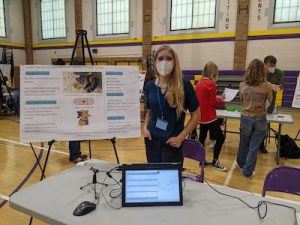UW–Madison PhD student Emma Hammond and Professor Catherine Marler have received the prestigious Gilliam Fellowship from the Howard Hughes Medical Institute (HHMI).

HHMI’s Gilliam Fellowships recognize outstanding research alongside a commitment to advancing equity and inclusion in science. The program supports pairs of graduate students and their dissertation advisors with $53,000 each year for up to three years. This year, HHMI awarded 50 student-advisor pairs the Gilliam Fellowship after receiving applications from a record 162 different institutions.
Marler’s lab in the Department of Psychology studies the endocrinology of the California mouse with current research topics covering pair bonding, social communication, territoriality, parental care, and oxytocin and testosterone’s effects on behavior.
As a PhD student in Psychology and a member of the Marler Lab, Hammond studies the relationship between oxytocin, immune function, and social behavior. Oxytocin has previously been shown to benefit immune function, Hammond said. However, in a study she conducted, oxytocin impaired healing and increased inflammation in animals that were socially isolated, suggesting that oxytocin could make illnesses worse in certain social settings.
“If you look at isolated versus socially housed animals, you would expect that isolation may lead to worse health outcomes,” Hammond said. “I was driven to this initial project through thinking about COVID-19 and the experience of isolation leading to worse outcomes.”
With support from the Gilliam fellowship, Hammond will continue to investigate the impact of oxytocin on the immune system in different social contexts. She’ll explore whether oxytocin might increase anxiety when given to animals that have experienced isolation or when monogamous animals have been separated from their long-term partner. She’ll also investigate microglia, a type of immune cell present in the brain and central nervous system, to see whether they are involved in the relationship between oxytocin and anxiety.
Marler noted that Hammond’s work is unique because it looks at multiple instances of oxytocin exposure, since existing animal work has often focused on acute oxytocin exposure.
“When you think of oxytocin, you probably think of positive interactions. That’s what we normally think about it, but it’s also associated with anxiety,” Marler said. “And acute [oxytocin] can alleviate anxiety, but we know less about how chronic [oxytocin] influences anxiety, and we also don’t know what the impact is, necessarily, of changing the social context.”
Hammond said this work will provide insight into the impact of oxytocin treatments for a variety of communities.
“Oxytocin is being given to people with anxiety disorder. It is being given to people with autism spectrum disorder. We don’t actually know yet the potential long-term consequences of that,” she said. “I think that it is valuable to get a comprehensive understanding of the impact of oxytocin treatment and why social context under which it’s given matters, because it does have real life outcomes for people who are being treated with oxytocin.”
Hammond said the Gilliam fellowship stood out to her due to HHMI’s values of inclusivity and representation in the sciences.
“That is something that I value a lot for a variety of reasons, [and] because of my personal experience as being someone with a disability not necessarily seeing myself represented as the scientist, but instead being represented as the target – someone who is impacted by research but not doing the research themselves who may not even always be a part of the conversation,” Hammond said. “HHMI really has made an effort to change that. They are investing in people who want to both represent themselves in the sciences, and also make a difference for others.”
At UW–Madison, Hammond has already been involved in projects and groups that help increase representation of diverse scientists. As part of the Antiracism Learning Action Group in Neuroscience (ALAN), a student organization, Hammond created a research opportunities catalog for the life sciences that helps underrepresented undergraduate students find inclusive research labs and get started with research. Along with other ALAN members, Hammond has also visited Madison East High School to talk with students about how to develop an identity as a scientist. This event brings in graduate students across the life sciences who are underrepresented in some aspect of their identity to provide a model for the high school students.
“Emma is a superb example of someone who is not just doing outstanding research – she’s been very creative, she’s a hard worker, and on top of all that, she not only does all this outreach work, but she also helps people in the lab,” Marler said. “She is just an amazing person in terms of all her qualities and her contributions.”
To increase the impact that groups like ALAN can have, Hammond co-hosted a workshop at the Society for Behavioral Neuroendocrinology about how to build and sustain learning action groups like ALAN, including a panel discussion for women and nonbinary people of color in the sciences to talk about how to make academia more inclusive. From there, Hammond and the panelists published a paper sharing their insights into how people can leverage power and privilege to increase equity in academia.
In addition to funding students’ research, the Gilliam fellowship provides some funding for students to tackle projects that increase inclusivity and representation in the sciences. Hammond plans to continue the work she’s been doing to increase representation and inclusivity, with more of a focus on the disabled community for her next project. She’ll also participate in leadership training and professional development with an emphasis on developing the next generation of scientific leaders.
Meanwhile, advisors named to the fellowship also participate in a year-long course on mentorship skills.
“I’m excited about the opportunities for mentorship and primarily for supporting diversity,” Marler said. “I really like helping my students and, often, it’s this lifelong help that you end up giving them if you’re trying to do a good job. And I think that extra support is really going to help.”
Read the full story here.